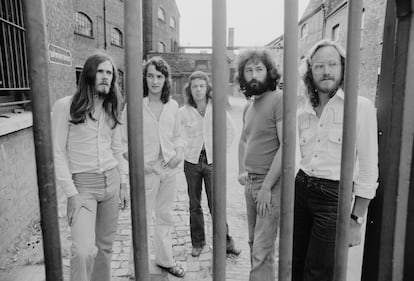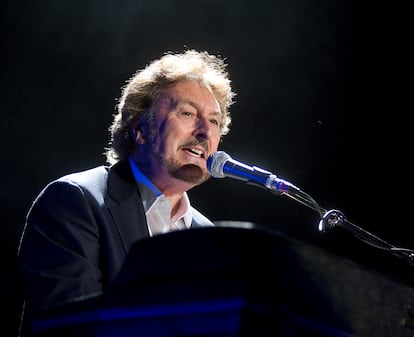Rick Davies, anti-rock star and founder of Supertramp, dies at 81.

He has gone as he lived, without making too much noise. The discreet Rick Davies, the anti-rock star, co-founder, singer, and songwriter of the English band Supertramp, has died at the age of 81 in his home on Long Island (New York) "after a long illness," according to the band itself. Davies was the frontman of Supertramp with Roger Hodgson. The group achieved its greatest success with the album Breakfast in America , 1979.
Davies was diagnosed with cancer in 2015 and has largely ceased his activity with Supertramp since then, although, once the aggressive phase of the disease was over, he enjoyed performing in small clubs near his home, where he played piano and sang rhythm & blues, his passion. Although Hodgson wrote and sang the band's most commercial tracks (" Give a Little Bit," "The Logical Song," and "Dreamer"), some of Davies' songs also received frequent radio play, such as "Goodbye Stranger" and "Bloody Well Right ."
Born in Swindon, UK, in 1944, Davies became interested in music from a young age. He first trained as a drummer and then as a keyboardist. In 1969, he posted an advertisement seeking musicians to join his new band, to which Hodgson responded. After a brief stint performing as Daddy, he changed his name to Supertramp. The group always boasted an atypical biography from the very beginning. Davies obtained financial backing from a wealthy Dutchman, Stanley August Miesegaes (friendly nicknamed Sam), who fell in love with the keyboardist's music.
The group's first two albums were paid for out of Sam's pocket: Supertramp, by 1970, and Indelibly Stamped, by 1971. The poor commercial success of both albums disappointed their patrons, who stopped paying the band's bills. Davies and Hodgson believed in their project, but found themselves facing bankruptcy almost at the outset. The two young musicians went all in on a new album. If it failed, it might be best to break up the band and devote their energies to other projects. This pressure produced perhaps their most compact work, Crime of the Century (1974). Here, the group's strengths begin to emerge: seasoned instrumentalists and a talent for crafting accessible melodies, a counterpoint to the thoughtful progressive rock of the time. It was also the album that highlighted the difference in style between the leaders. Davies preferred elaborate, piano-based structures with a blues leaning; Hodgson belonged to the Beatles school, with sunny vocal harmonies and a touch of commercial appeal. “They were two completely different, antagonistic personalities,” bassist Dougie Thomson told EL PAÍS in 2023. They co-wrote songs, but worked separately.

Their differences were not limited to the musical. They clashed in personality: Davies, from a working-class background, declared himself a pragmatist; Hodgson, from a wealthy background, acted as a spiritualist and idealist. The former was a carnivore; the latter, a vegetarian. Serious problems, however, would take time to arise. The albums Crisis? What Crisis? (1975) and Even in the Quietest Moments... (1977) established the English group commercially, and they moved to the United States, a much more lucrative market than the European one.
Massive success came with Breakfast in America (1979), an album that reached number one in sales in many countries, including Spain. It sold 30 million units and won two Grammy Awards. As many as four singles were released, but there could have been more. Supertramp was the band of the moment, and their songs received heavy radio airplay. It is, without a doubt, their most commercial work, something that didn't please the music press, which criticized their premeditated sales pitch. These same journalists were also unenthusiastic about the measured nature of its members. In reality, Supertramp was a band without a recognizable face, and they didn't promise anything morbid. While other seventies bands embraced the hooligan clichés of rock, they embraced their success without exhibitionism. In journalistic terminology: they weren't playing fast and loose.

The grueling tour for this album dramatically distanced the two frontmen. They engaged in a game of blaming each other for their differences in the songs. While Davies wrote Casual Conversations Denouncing how difficult it was to communicate with Hodgson, he responded with Child Of Vision , where he exposes the materialistic life that in his opinion Davies had adopted.
Years later, Hodgson explained the prevailing mood within Supertramp in 1980: “I felt like the band was falling apart. At those massive shows, I felt like some kind of actor doing the same performance night after night. We had become slaves to a big production.” Finally , in 1983, Hodgson left the group to pursue a solo career. A pact was reached: Hodgson allowed Davies to continue as Supertramp on the condition that he not play any of their songs. This was too much: it meant skipping School, Breakfast in America, The Logical Song , and Give a Little Bit. The agreement lasted a few months, until Davies grew tired of audience requests for those songs at concerts. For almost four decades, the group lived under tension, including lawsuits from the other musicians from the classic lineup, who demanded that Davies and Hodgson exploit part of the copyright to the songs they had contributed to.
There were also attempts at reconciliation between the two, but they fell through at the last minute on three occasions. Both Davies and Hodgson have been performing Supertramp songs separately, maintaining a repertoire that still occupies space on classic rock radio stations today.
EL PAÍS



%3Aformat(jpg)%3Aquality(99)%3Awatermark(f.elconfidencial.com%2Ffile%2Fbae%2Feea%2Ffde%2Fbaeeeafde1b3229287b0c008f7602058.png%2C0%2C275%2C1)%2Ff.elconfidencial.com%2Foriginal%2Fd23%2Fff7%2Ff19%2Fd23ff7f19decec5fb36c1e992edab804.jpg&w=3840&q=100)

